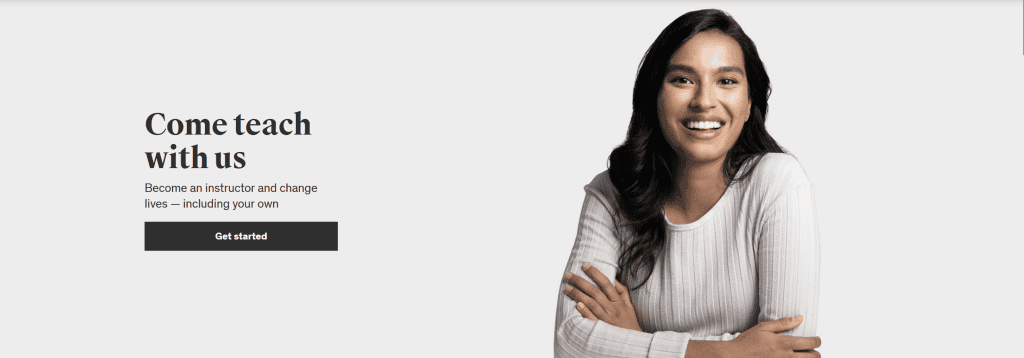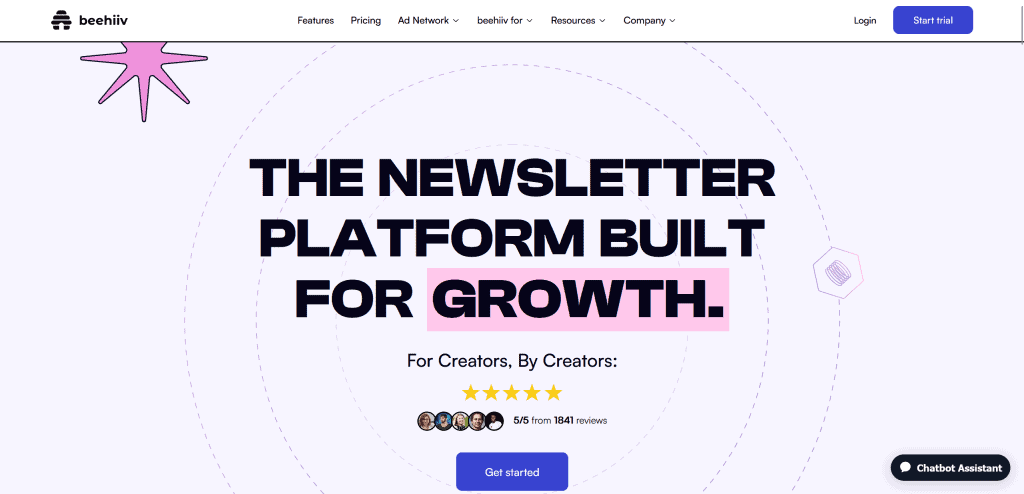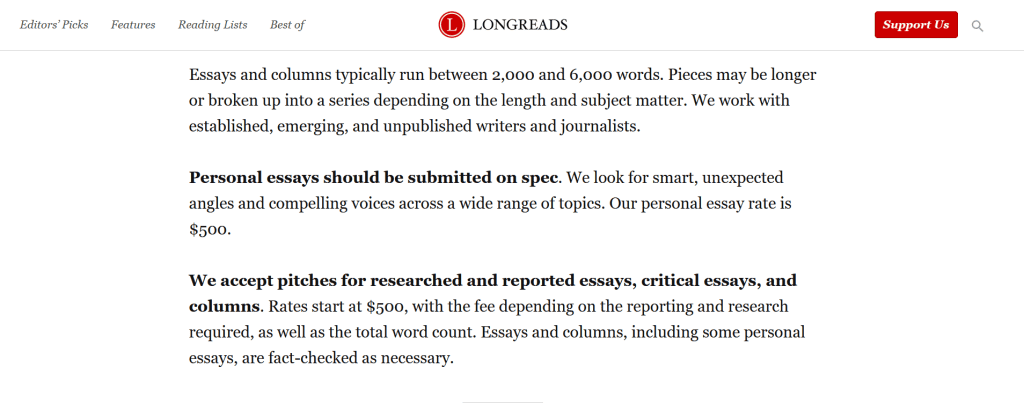Writing is fun, but it’s even more fun when it pays.
You could be a student, a stay-at-home parent, or someone looking to make some extra income by writing long-form, copywriting, or even poetry.
Whatever the reason, know that writing pays well, and several people make a living out of it.
But there’s no easy way to make money writing. It may take months, and you might even have to work unpaid initially. It depends on the route you take for your writing career.
Know that there’s no one size fits all. Some writers work with clients directly, while others go through freelancing platforms or writing agencies. There’s also a group that solely focuses on creating content for online platforms like blogs, social media, or ebooks.
Regardless of your chosen path, writing involves effort because of high competition, rising AI alternatives, and people’s rapidly changing reading habits.
But don’t let this discourage you because there are over 20 different revenue sources that you can depend on to make writing your career.
But for starters, know what you can write to make money.
Types Of Writing Skills
Be it a novel, an advertisement, or a blog post – there are various ways to monetise your writing skills. Here are some skills that you need to learn before heading into the writing career-
- Copywriting – It’s a skill that involves writing persuasive and compelling content for marketing purposes. For example, an ad that aims to promote a product or service. Cop writing is usually short-form and has a direct call-to-action for the audience.
- Content Writing – It involves creating informative and engaging, long-form content. Content writing includes articles, blog posts, ebooks, or product descriptions.
- Creative Writing – This includes a range of forms such as poetry, short stories, novels, and scripts for plays or films. Creative writing allows you to explore your imagination and express yourself through words.
- Technical Writing -It involves writing technical documents like manuals, reports, or instructions for a specific audience. Technical writers need to have strong analytical skills and the ability to simplify complex information.
- Ghostwriting – It’s a form of writing where you write for someone else who takes credit for your work. Celebrities or public figures usually hire ghostwriters to write their biographies, speeches, or articles. What separates ghostwriters from content writers is that ghostwriters are good at copying someone else’s tone or voice.
- Editing and Proofreading – Editors are responsible for improving the overall quality of content by fixing grammar, spelling, and punctuation errors. They also ensure that the writing is clear, concise, and consistent. Proofreaders focus on catching any mistakes in the final draft before it gets published.
- SEO Writing – SEO (Search Engine Optimisation) writing involves creating content that is optimised for search engines. This type of writing requires an understanding of keywords, meta descriptions, and other SEO techniques to improve the visibility of a website or webpage.
- Copyediting – This type of editing involves checking for errors in grammar, spelling, and punctuation. Copyeditors also ensure consistency in style, tone, and formatting throughout a written piece.
- Resume and Cover Letter Writing – This involves creating professional documents that showcase a person’s skills, experience, and qualifications for a specific job. Resume writers use persuasive language to make the applicant stand out from other candidates.
- Academic Writing is a formal type of writing often used in educational or research settings. Academic writers need to have excellent research skills and present their findings clearly and organized.
- Grant Writing – Grant writers are responsible for creating proposals to secure funding for organisations or causes. They need to have strong persuasive writing skills and be familiar with the grant application process.
- Speech Writing – Speech writers create written speeches for individuals or organisations to be delivered at public events. They need to have a strong understanding of the intended audience and use persuasive language to effectively convey the message.
- Scriptwriting – Scriptwriters write scripts for various types of media, such as film, television, and theatre. They need to have a strong understanding of storytelling and character development.
How To Make Money Writing?
No matter what writing skill you excel in, you usually capitalise on three revenue streams as a writer –
- Income from clients
- Income from platforms
- Income from original work
And these three streams give rise to tens of revenue models for you as a writer.
Become a Freelance Writer

- What is it: Offering writing services on a project or contract basis.
- Service offered: Articles, blog posts, copywriting, content marketing, technical writing, etc.
- Revenue stream: Per project, hourly rate, or retainer.
- Revenue potential: $20 to $150+ per hour, depending on experience and niche.
A writing freelancer is someone who offers writing services on a project or contract basis to clients. The services include all writing, editing, proofreading, and publishing jobs that require language skills.
You find clients either –
- Directly: You approach clients directly via email, LinkedIn, or through your website.
- Platforms: You register yourself with a writing platform like Upwork and Fiverr, create a portfolio, upload samples of your work and offer services to clients posting projects.
- Dropservicing: You work with another freelancer or agency to take on more projects than they can handle and get you work for a commission.
Freelancing is a client-oriented revenue model. Therefore, your income largely depends on how many clients you find and work with effectively. Moreover it requires soft skills like client management, negotiation, and communication to have a stable source of income with your invoices paid regularly.
Name | Description | Visit |
|---|---|---|
Toptal | A platform that connects clients with the top 3% of freelance talent, including writers and editors. | |
Upwork | A global freelancing platform where businesses and independent professionals connect and collaborate. | |
Fiverr | An online marketplace for freelance services, offering tasks and services starting at $5. | |
Freelancer | A platform that connects over 44 million employers and freelancers globally from over 247 countries. | |
Guru | An online platform that allows companies to find freelance workers for commissioned work. | |
PeoplePerHour | A UK-based platform that provides businesses access to freelance workers globally. |
Start Your Blog
- What is it: Creating and maintaining a personal blog on a specific niche.
- Service offered: Content creation, affiliate marketing, sponsored posts, advertising.
- Revenue stream: Ad revenue, affiliate commissions, sponsored content, product sales.
- Revenue potential: $100 to $10,000+ monthly, depending on traffic and monetisation strategies.
A blog is a website or online platform where individuals or groups share their thoughts, opinions, and expertise on a specific topic. As a blogger, you can choose your niche and create content that appeals to your target audience.
To start a blog, you will need to:
- Choose a niche that you are knowledgeable and passionate about.
- Set up a website or use a blogging platform like WordPress or Blogger.
- Research and create engaging content that adds value to your readers.
- Create high-quality content consistently to attract readers and build an audience.
- Monetise your blog through various strategies such as affiliate marketing, sponsored posts, advertising, and selling products related to your niche.
- Promote your blog through social media, SEO, and collaborations with other bloggers or brands.
Starting a successful blog takes time and effort, but it can be a fulfilling and lucrative career that doesn’t involve dealing with clients. With a consistent flow of traffic and effective monetisation strategies, a blog has the potential to generate significant passive income.
Write and Sell eBooks

- What is it: Authoring and self-publishing eBooks on platforms like Amazon Kindle.
- Service offered: eBooks on various topics, fiction, non-fiction, guides, and how-tos.
- Revenue stream: Royalties from sales.
- Revenue potential: $1 to $10+ per book sold, scalable with volume and marketing.
Ebooks, even though they have been around for a while, are still popular among readers due to their convenience and affordability. As a writer, creating an eBook can be a great way to showcase your expertise and reach a wider audience.
To start writing and selling eBooks, you will need to:
- Choose a topic or genre that you are passionate about and have knowledge in.
- Conduct thorough research and create high-quality content.
- Design an attractive cover that captures the attention of potential readers.
- Format your eBook properly for different devices like Kindle, iPad, etc.
- Use self-publishing platforms such as Amazon Kindle Direct Publishing (KDP) or Barnes and Noble Press to sell your eBook.
- Market your eBook through social media, email marketing, and collaborations with other bloggers or influencers in your niche.
Creating and selling eBooks can be a profitable venture, especially if you can establish yourself as an expert in a specific niche or genre. However, with increased competition, it is crucial to optimise your listing on marketplaces (if you rely on marketplaces like Amazon) and constantly work on promoting your eBook to reach more readers.
Create Online Courses

- What is it: Developing and selling online writing courses on platforms like Udemy or Teachable.
- Service offered: Video lessons, written guides, assignments, and quizzes.
- Revenue stream: Course sales, subscription fees.
- Revenue potential: $50 to $500+ per course sale, depending on course quality and demand.
Even though not entirely writing-focused, creating and selling online courses can be a profitable source of income for writers. Online learning has become increasingly popular, and many people are willing to pay for valuable courses that will help them improve their writing skills.
If you possess expertise in a particular writing style, niche, or genre, you can create an online course and sell it on popular platforms like Udemy or Teachable. These platforms provide all the necessary tools to create and host your course, making it easier for you to focus on developing quality content.
To increase your revenue potential, you can also offer subscriptions for ongoing access to your courses or bundle multiple courses together for a discounted price.
Offer Ghostwriting Services

- What is it: Writing content for others who take credit for the work.
- Service offered: Books, articles, blog posts, speeches.
- Revenue stream: Per project or per word.
- Revenue potential: $0.10 to $1+ per word, or $2,000 to $50,000+ per book.
A ghostwriter is someone who writes content for others without receiving any credit or recognition. They are experts in copying someone else’s voice and style, making it seem as if the content was written by the person taking credit for it. Many busy professionals, celebrities, and public figures hire ghostwriters to create content for them while they focus on other aspects of their work.
As a ghostwriter, you can work on projects such as books, articles, blog posts, speeches, and more. You can charge per project or per word, with rates ranging from $0.10 to $1+ per word or even higher for larger projects like books.
Start a Writing Agency

- What is it: Establishing a business that offers a wide range of writing services to clients through a team of writers.
- Service offered: Content creation, copywriting, ghostwriting, technical writing, editing, proofreading, content strategy, and more.
- Revenue stream: Project fees, retainer agreements, hourly rates, or per word/page charges.
- Revenue potential: $2,000 to $50,000+ per month, depending on the number of clients, size of projects, and efficiency of the team.
When your freelance business grows, and you have a consistent stream of clients, it might be time to consider starting your own writing agency. This will allow you to take on more projects and offer a wider range of services to clients through a team of writers.
Your writing agency can offer services such as content creation, copywriting, ghostwriting, technical writing, editing, proofreading, content strategy, and more. You can charge project fees or retainer agreements with clients, or even hourly rates or per word/page charges, depending on the type of project.
The revenue potential for a writing agency can vary greatly depending on the number of clients and projects you take on, the size of the projects, and the efficiency of your team. Some agencies can bring in anywhere from $2,000 to $50,000 or more per month.
However, you should know that starting a writing agency requires strong project management skills and the ability to effectively communicate with clients and your writing team. It also involves setting up systems and processes for managing projects, tracking deadlines and payments, and ensuring quality control.
Write for Content Mills

- What is it: Producing high-volume content for websites that pay per article or word.
- Service offered: Articles, product descriptions, blog posts.
- Revenue stream: Per word or per article.
- Revenue potential: $0.01 to $0.10 per word, typically lower but steady income.
A content mill, also called a content farm or writers’ mill, is a company that produces large amounts of low-quality web content, typically articles and blog posts, for clients. Their main purpose is to provide a large volume of content quickly and cheaply.
Content mills are often seen as controversial in the writing industry because they tend to pay very low rates for writers, sometimes as low as $0.01 per word. However, some writers still find success in earning a steady income by working for multiple content mills at once and producing a high volume of content.
If you have strong time management skills and can produce quality work quickly, writing for content mills could be a viable option for generating revenue as a freelance writer. Just be aware that these types of companies typically have strict guidelines and may require you to write about a wide range of topics, so it may not be the best fit for writers looking to specialise in a certain niche.
Start a Patreon

- What is it: Building a membership platform for fans who pay for exclusive content.
- Service offered: Articles, stories, behind-the-scenes content, personalised writing.
- Revenue stream: Monthly subscriptions from patrons.
- Revenue potential: $1 to $100+ per patron per month.
If you have a loyal following of fans who are willing to support your work, starting a Patreon account could be a great way to generate revenue as a writer. Patreon is a membership platform where creators can offer exclusive content and perks to their supporters in exchange for monthly payments.
As a writer, you can offer different tiers of membership with varying levels of benefits and rewards. For example, you could offer early access to your articles or stories, personalised writing for patrons, or even behind-the-scenes looks at your writing process. The key is to provide value to your patrons and make them feel like they are getting something special for supporting you.
With Patreon, the amount of revenue you can generate depends on the number and loyalty of your patrons. You could potentially make anywhere from $1 to $100 or more per patron per month, so it’s important to have a strong following and consistently provide quality content.
Join Affiliate Programs

- What is it: Promoting products or services and earning a commission on sales made through your referral links.
- Service offered: Product reviews, blog posts, newsletters.
- Revenue stream: Commission per sale.
- Revenue potential: 5% to 50% commission per sale, depending on the program.
Affiliate marketing refers to the practice of promoting products or services and earning a commission for each sale made through your unique referral link. As a writer, you can join affiliate programs and use your writing skills to create promotional content for the products or services that you believe in.
The best part is that you’re not limited to just one affiliate program – you can join multiple programs and promote a variety of products or services on your website, blog, social media platforms, or even in your newsletters. This allows you to diversify your revenue streams and potentially earn more income.
However, it’s important to note that building a successful affiliate marketing strategy takes time and effort. It requires creating high-quality content that resonates with your audience and effectively promotes the products or services you’re affiliated with. But, once you have a strong following and a loyal audience, affiliate marketing can be a lucrative source of passive income for writers.
Start Your Newsletter Business

- What is it: Creating and managing a subscription-based newsletter focused on a specific niche or topic of interest.
- Service offered: Regularly published newsletters featuring high-quality content, insights, news, and exclusive information.
- Revenue stream: Subscription fees, sponsorships, affiliate marketing, and premium content.
- Revenue potential: $500 to $20,000+ per month, depending on the number of subscribers and monetisation strategies.
A newsletter is a recurring email sent to a list of subscribers who have opted in to receive updates and information from you. It’s similar to a blog or website, but it is delivered directly to your audience’s email inbox.
As a writer, starting a newsletter business can be an excellent way to showcase your writing skills and expertise in a specific niche or topic. With new startups like Beehiiv, Substack, etc., focusing exclusively on newsletter subscriptions, this is a growing market with great potential for writers.
To start a newsletter business, you will need to:
- Choose a niche or topic: Identify your target audience and choose a niche or topic that you are knowledgeable about and passionate about writing.
- Create high-quality content: Your newsletters should be well-written and engaging and provide valuable insights or information to your subscribers. This will help keep them interested and subscribed.
- Set up an email marketing service: Use an email marketing platform like Mailchimp, Constant Contact, or ConvertKit to create and send professional-looking newsletters.
- Build a subscriber list: Promote your newsletter through social media, guest blogging, and other marketing strategies to attract subscribers.
- Monetise your newsletter: There are several ways to generate revenue from your newsletter, such as charging a subscription fee, including sponsored content or affiliate links, offering premium content for a higher price, etc.
Of course, the success of your newsletter business will depend on the quality and relevance of your content, as well as your ability to consistently deliver valuable information to your subscribers.
Self-Publish Print Books

- What is it: Publishing your own books in print format.
- Service offered: Novels, non-fiction books, poetry collections.
- Revenue stream: Royalties from book sales.
- Revenue potential: $5 to $25+ per book sold.
You, as an author, don’t have to wait for a traditional publishing company to accept your manuscript and publish your book. With the rise of self-publishing platforms like Amazon’s CreateSpace, Lulu, and IngramSpark, you can easily produce and sell physical copies of your book on demand.
This option is ideal for writers who want complete creative control over their work and want to keep a higher percentage of the profits from their book sales. However, it also means that you will be responsible for all aspects of publishing, including editing, formatting, cover design, marketing, etc.
To self-publish print books successfully, here are some steps you should follow:
- Prepare your manuscript: Make sure your book is professionally edited and proofread, as well as properly formatted for printing.
- Create a cover design: A visually appealing cover can make all the difference in attracting readers to your book.
- Choose a self-publishing platform: Research and compare different platforms to find the one that best suits your needs and budget.
- Set up pricing and distribution options: Decide on the price of your book and where you want it to be available for purchase (e.g. online retailers, physical bookstores).
- Market your book: Utilise social media, book bloggers, online book clubs, and other marketing strategies to promote your book and reach potential readers.
- Order a proof copy: Before making your book available for purchase, it’s important to order a physical proof copy to check for any errors or formatting issues.
- Publish and distribute: Once you’re satisfied with the final product, publish your book on the chosen platform and make it available for purchase.
- Track sales and royalties: Keep track of your book sales and calculate your earnings based on the platform’s royalty rates.
Self-publishing can be a daunting process, but it also offers great potential for you to share your work with the world.
Write and Sell Printables

- What is it: Designing and selling printable materials like planners, worksheets, and journals.
- Service offered: Digital downloads of writing aids and organisational tools.
- Revenue stream: Sales from Etsy or your own website.
- Revenue potential: $5 to $30+ per item sold.
A printable is a digital file that can be downloaded and printed by the customer. For example, you could design a weekly planner with inspiring quotes or a self-care journal with prompts and activities. The possibilities are endless, and the demand for printables is constantly growing.
To start selling printables, here are some steps to follow:
- Choose a niche: Decide on a specific topic or audience for your printables, such as productivity, self-improvement, or organisation.
- Create high-quality designs: Use design software like Canva or Adobe Creative Suite to create visually appealing and functional printables.
- Set up an online store: You can sell your printables on platforms like Etsy, Shopify, or even your own website.
- Promote your products: Use social media, email marketing, and collaborations with other creators to promote your printables and reach potential customers.
- Keep track of sales and earnings: Monitor your sales and calculate your earnings based on the prices you set for each printable.
The beauty of selling printables is that it can be a passive income stream. Once you have created and listed your designs, you can continue to earn money as customers purchase them. You can also update and create new designs to keep your offerings fresh and attract repeat customers.
Write for Websites That Pay for Writing

- What is it: Contributing articles and content to websites that pay writers for their submissions.
- Service offered: Articles, blog posts, reviews, tutorials, and other written content.
- Revenue stream: Payments per article, per word, or per project.
- Revenue potential: $50 to $500+ per article, depending on the website and the quality of the content.
Websites like these pay when you submit an original article or content that meets their guidelines and standards. These can include writing for popular blogs, news websites, or niche sites that cater to a specific audience.
- Longreads: This website publishes and promotes well-written, longer-form content. They pay $500 for articles that are at least 2,000 words.
- Copyhackers: This website focuses on copywriting and content marketing. It pays $300 for articles that are at least 1,000 words long.
- Listverse: This website publishes list-style articles on various topics. They pay $100 for each article that is accepted and published.
Several other websites accept submissions and pay writers for their content. However, while they sound like easy ways to make money, the competition can be tough and the acceptance rate can be low. Therefore, you can’t rely on this revenue stream as your career’s sole support. It can, however, be a great way to supplement your income and gain exposure as a writer.
A startup consultant, digital marketer, traveller, and philomath. Aashish has worked with over 20 startups and successfully helped them ideate, raise money, and succeed. When not working, he can be found hiking, camping, and stargazing.








